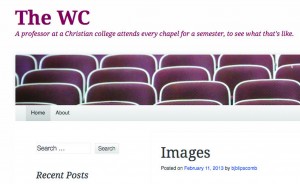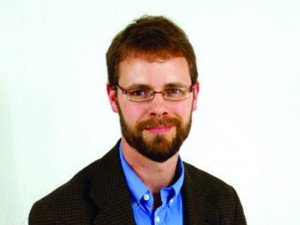
thedoubleusee.wordpress.com
At the start of the spring semester, Professor Benjamin Lipscomb, philosophy, began a ritual of not only attempting to attend every chapel from now until the end of the school year, but also of documenting each experience via online blogging.
When asked what he hopes to achieve from undertaking such an intentional challenge, Lipscomb said, “It’s several things; it’s wanting to be more gratefully receptive to the work of my colleagues who put the chapels on, the students, the chapel deacons… it’s partly just seeing what it’s like or what it might do for me; partly to get a better sense of the value or lack of value of it.”
Though the blog’s origin and ultimate subject is Houghton College, Lipscomb aims towards a broader audience by minimizing the use of names and allowing chapel lectures to lead him to more broadly relatable topics.
He said, “I try to keep it anonymous in some small ways. I don’t use the name ‘Houghton’; I edit comments if they use the name ‘Houghton.’ I never use the name of anyone on campus.”
Lipscomb establishes his goal for such anonymity by saying, “It’s something that also maybe makes [the blog] more widely accessible, as something that someone might be interested in who’s not a Houghton person. I try to make it about a certain kind of experience that’s recognizable in a number of evangelical communities or evangelical colleges.”

Professor David Huth, visual communication and media arts, and friend of Lipscomb, said, “The blog certainly isn’t ‘about’ the chapel events, or the chapel program, or even Houghton College. If you read his posts, you can see that all of these things are simply jumping-off places for reflections and questions in his mind. The structure and schedule of Houghton’s chapel programming (and general subject matter of religion and community) are providing prompts for Professor Lipscomb’s thinking.”
Lipscomb’s interest also resides in the exploration of the idea that a mandated chapel schedule serves as a shared, communal experience.
In the first entry of his blog, he wrote concerning this aspect of chapel, saying, “I think it’s supposed to contribute to the formation, both of the spirituality of individual community members and of a communal ethos. And I’m not being formed in whatever way that is, or not much. I wonder too what difference it might make in my interactions with students if we had this experience in common. Would it become a topic with us, a point of connection?”
As the college requires regular chapel attendance of students, and faculty are encouraged to do the same, chapel acts as a point of intersection, which tends to elicit interaction or common conversation amongst chapel attendees.
When asked more about this idea of exploring the effects of such a shared experience, Lipscomb said, “What do I hope might come of it? I hope more conversation about chapel – not only critical; not even principally critical… We’re a college; we’re a community of intellectual conversation. The more I can cultivate or provoke people to talk about what they’re experiencing, what they’re listening to… the happier I’ll be.”
Thus, Lipscomb views his goal of faithful chapel attendance as not exclusively an act of self-discipline, but rather an act of community.
While discussing such an idea, Lipscomb went on to say, “I’m joining in the community in a way that I haven’t been required to… It seems to me it heightens the sense of community, it makes some more community than there would be otherwise, between the students and myself. It gives me a chance to see how chapel functions, or whether it functions in that way.”
Since Houghton College refrains from requiring faculty members to attend chapel lectures like it requires of its students, Lipscomb’s new habit also functions as a deliberate act of self-discipline.
Lipscomb plans to explore the students’ chapel requirement in light of the faculty’s lack of requirement.
He said, concerning Houghton’s current chapel practice, “It’s coerced. Sometimes coercion ends up working for our own good; sometimes it’s just coercion… there are times when we are coerced to do things that are for our good and we’re glad in the end that we have been. I almost wonder whether the choice should be, ‘We will coerce this of our students and of ourselves as the rest of the community, or we won’t do either.’”
By willingly placing himself in the position of Houghton students, who are required to attend two-thirds of all regular chapels offered, Lipscomb hopes to relate to such an experience while simultaneously analyzing its purpose.
As Lipscomb muses in his blog, “The students living under the requirement–they’re busy. They make the time; they have to. What would it be like for me, I wondered, if I did too?”
To read Lipscomb’s blog go to http://thedoubleusee.wordpress.com/
